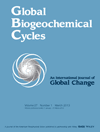
GLOBAL BIOGEOCHEMICAL CYCLES
metrics 2024
Leading the charge in interdisciplinary environmental research.
Introduction
GLOBAL BIOGEOCHEMICAL CYCLES, published by the American Geophysical Union, is a leading journal in the field of geochemistry that has gained significant recognition since its inception in 1987. With an impressive impact factor and a Q1 ranking in multiple categories such as Atmospheric Science, Environmental Chemistry, and Global and Planetary Change, it serves as a crucial platform for the dissemination of high-quality research. This journal emphasizes interdisciplinary studies focusing on biogeochemical processes and their implications for global environmental change, attracting contributions from a diverse range of scientific communities. Researchers, professionals, and students engaged in atmospheric sciences, environmental chemistry, and planetary sciences will find invaluable insights and state-of-the-art methodologies within its pages. GLOBAL BIOGEOCHEMICAL CYCLES continues to advance our understanding of the Earth’s systems, thus holding a pivotal position in shaping future environmental policies and sustainability efforts.
Metrics 2024
 2.39
2.39 5.40
5.40 6.60
6.60 212
212Metrics History
Rank 2024
Scopus
IF (Web Of Science)
JCI (Web Of Science)
Quartile History
Similar Journals
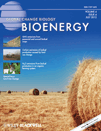
Global Change Biology Bioenergy
Innovating Tomorrow's Bioenergy Through Biological InsightsGlobal Change Biology Bioenergy, published by WILEY, is a leading peer-reviewed journal that focuses on the interplay between biological processes and bioenergy production, contributing significantly to the fields of agronomy, forestry, and environmental sustainability. Established in 2009, this Open Access journal, based in Germany, has gained recognition in the academic community, boasting impressive quartile rankings in 2023: Q1 in Agronomy and Crop Science, Forestry, Renewable Energy, Sustainability and the Environment, and Waste Management and Disposal. With its rigorous publication standards and commitment to disseminating vital research, Global Change Biology Bioenergy ranks highly in various Scopus categories, ensuring that cutting-edge studies reach a broad audience. By providing a platform for innovative research, the journal fosters collaboration and knowledge exchange among researchers, professionals, and students dedicated to tackling the pressing challenges posed by global change and the future of bioenergy.

BIOGEOCHEMISTRY
Unveiling innovative insights into Earth's surface and water dynamics.BIOGEOCHEMISTRY is an esteemed journal published by Springer, dedicated to advancing the understanding of biogeochemical processes across a range of ecosystems. Since its inception in 1984 and continuing into its converged trajectory through 2024, the journal has established itself as a critical resource in the fields of Earth-Surface Processes, Environmental Chemistry, and Water Science and Technology. With a prestigious Q1 ranking across these categories as of 2023, it ranks among the top journals in its field, reflecting its significant impact on current research and knowledge dissemination. Researchers, professionals, and students alike can benefit from the journal's rigorous peer-reviewed articles that contribute vital insights and innovative research findings. Although currently not an open-access journal, BIOGEOCHEMISTRY remains a leading platform for sharing high-quality scientific work that addresses pressing environmental challenges.
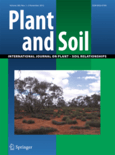
PLANT AND SOIL
Innovating research to enhance crop productivity and ecosystem balance.PLANT AND SOIL is a prestigious academic journal that has been at the forefront of plant and soil research since its inception in 1948. Published by SPRINGER in the Netherlands, this journal has carved a niche as a leading source of high-quality, peer-reviewed articles, which are essential for researchers, professionals, and students in the fields of Plant Science and Soil Science. With an impressive impact factor placing it in the Q1 category of both disciplines, it ranks 50th in the field of Plant Science and 24th in Soil Science, highlighting its influence in the scientific community. Although not available as open access, the journal provides a wealth of knowledge and insights into the interactions between plants and soils, exploring critical topics such as soil health, crop productivity, and sustainable agriculture practices. Researchers who wish to contribute to this vital area of study through their empirical findings will find PLANT AND SOIL to be an invaluable platform for disseminating their work and connecting with a network of leading scholars committed to advancing our understanding of these essential ecosystems.
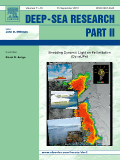
DEEP-SEA RESEARCH PART II-TOPICAL STUDIES IN OCEANOGRAPHY
Navigating New Frontiers in Marine ScienceDEEP-SEA RESEARCH PART II-TOPICAL STUDIES IN OCEANOGRAPHY is a leading journal in the field of oceanography, published by PERGAMON-ELSEVIER SCIENCE LTD. With an impressive ranking of Q1 in Oceanography and holding the 20th position out of 145 journals in the Earth and Planetary Sciences category, this journal provides a prominent platform for researchers and practitioners alike. Covering topical studies in oceanography since its inception in 1993, it continues to contribute significant insights into deep-sea research, enhancing our understanding of marine environments. Although the journal does not presently offer Open Access options, it remains a vital resource, appealing to students and professionals who seek to engage with innovative research and practical applications in the oceanographic community. The journal's ongoing commitment to excellence is evident as it plays a crucial role in advancing the field leading up to the present day and beyond.
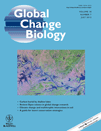
GLOBAL CHANGE BIOLOGY
Illuminating the Path of Biological Response to Global ChangeGLOBAL CHANGE BIOLOGY, published by Wiley, is a leading journal dedicated to advancing the scientific understanding of the relationships between biological systems and global environmental changes. With an impressive impact factor placing it in the Q1 category across multiple disciplines—including Ecology, Environmental Chemistry, and Global and Planetary Change—this journal is essential for researchers, professionals, and students aiming to stay at the forefront of this dynamic field. The journal has a rich history since its inception in 1995, continually providing a platform for high-quality research that informs policy and management practices worldwide. Although it is not open access, the journal remains a valuable resource for those committed to exploring the complexities of ecological and environmental change. With a Scopus ranking of #3 in Global and Planetary Change and #6 in both Ecology and Environmental Chemistry, GLOBAL CHANGE BIOLOGY continues to shape the dialogue on the pressing environmental challenges of our time.
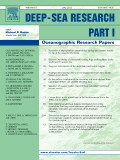
DEEP-SEA RESEARCH PART I-OCEANOGRAPHIC RESEARCH PAPERS
Connecting scholars to the depths of ocean research.DEEP-SEA RESEARCH PART I-OCEANOGRAPHIC RESEARCH PAPERS is a prestigious journal published by Pergamon-Elsevier Science Ltd, dedicated to advancing the field of oceanography. With an ISSN of 0967-0637 and E-ISSN of 1879-0119, this journal provides a vital platform for researchers, professionals, and students to disseminate and access high-quality, peer-reviewed papers on various aspects of oceanographic research. Recognized in the top quartiles of aquatic science and oceanography (Q1 and Q2 respectively), DEEP-SEA RESEARCH PART I boasts a significant impact factor and ranks impressively within the Scopus database, positioning itself as a leading resource in its field. Although it does not provide open access, it remains a critical repository of knowledge for those invested in understanding the complexities of marine environments. This journal plays a crucial role in enhancing our comprehension of deep-sea ecosystems, promoting innovative research, and fostering interdisciplinary collaboration.

ECOSYSTEMS
Transforming ecological insights into actionable knowledge.ECOSYSTEMS, an esteemed journal published by SPRINGER, stands at the forefront of ecological research with a distinguished Q1 quartile ranking in multiple categories, including Ecology, Evolution, Behavior and Systematics, and Environmental Chemistry for 2023. Founded in 1998, the journal has become crucial for advancing our understanding of ecosystem dynamics and interactions, offering researchers a platform to disseminate significant findings relevant to ecological health and sustainability. Although Open Access is not available, the journal maintains a robust reputation, evidenced by its high Scopus rankings—placing it within the top 10% in diverse ecological domains. With a publication scope that spans fundamental and applied aspects of ecosystems, ECOSYSTEMS serves as an essential resource for professionals and students pursuing innovative ecological solutions, making it indispensable for contributing to the global conversation on environmental sustainability. For more information, please visit the publisher's site or access your institution's library resources.
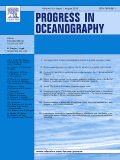
PROGRESS IN OCEANOGRAPHY
Connecting Scholars to the Ocean's SecretsPROGRESS IN OCEANOGRAPHY is a pivotal journal published by PERGAMON-ELSEVIER SCIENCE LTD, dedicated to advancing the field of oceanographic research and exploration. With an ISSN of 0079-6611 and an E-ISSN of 1873-4472, this esteemed publication has been disseminating significant findings from 1963 and continues to be a cornerstone in aquatic sciences and geology, holding a distinguished Q1 ranking in both categories as of 2023. The journal primarily focuses on innovative research that contributes to our understanding of ocean processes, marine ecosystems, and the impact of human activities on the oceans. Its exclusive access model facilitates the dissemination of high-quality content that resonates with researchers, professionals, and students alike, ensuring that vital insights are accessible to the global scientific community. With a firm commitment to upholding rigorous scientific standards, PROGRESS IN OCEANOGRAPHY remains an influential platform for the communication of groundbreaking research, providing scholars with invaluable resources to drive future oceanographic studies.
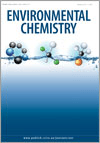
Environmental Chemistry
Advancing Sustainable Solutions Through Chemical InsightsEnvironmental Chemistry, published by CSIRO PUBLISHING, is a pivotal journal in the field of environmental studies, focusing on the intricate relationships between chemical processes and environmental systems. With an ISSN of 1448-2517 and an E-ISSN of 1449-8979, this journal serves as a vital resource for researchers, professionals, and students alike, aiming to deepen their understanding of environmental chemistry. The journal, which spans the period from 2004 to 2024, boasts respectable rankings, including a Q2 categorization in both Chemistry (miscellaneous) and Geochemistry and Petrology, alongside a Q3 ranking in Environmental Chemistry for 2023. With a focus on publishing high-quality research that addresses pressing environmental challenges, Environmental Chemistry continues to make significant contributions to the field, fostering advancements in sustainable practices and innovative solutions. Researchers are encouraged to explore this journal's comprehensive archive for cutting-edge studies and discussions that are imperative for the future of environmental health and policy.

Nature Reviews Earth & Environment
Uncovering Solutions for a Resilient PlanetNature Reviews Earth & Environment, published by SpringerNature, serves as an essential platform for researchers and professionals in the fields of environmental science, atmospheric science, and earth-surface processes. Since its inception in 2020, this distinguished journal has quickly established itself as a leading resource, achieving Q1 quartile rankings in multiple categories including Atmospheric Science and Pollution, reflecting its commitment to high-quality, impactful research. With an impressive Scopus ranking as #1 in its respective categories and a 99th percentile standing, the journal is pivotal for those seeking to explore cutting-edge advancements and critical insights in the interplay between our planet's environment and humanity. The publication encourages open discourse through its accessible content, aiming to inspire and inform its audience about pressing environmental challenges and innovative solutions. As it continues to converge through to 2024, Nature Reviews Earth & Environment stands out as a vital resource for anyone dedicated to understanding and preserving our planet.